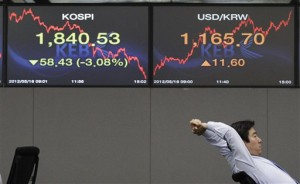World markets waver over Greece vote, US data
LONDON — World stocks laid low by a call for new elections in Greece and prolonged agony in the eurozone wavered in nervous trade on Wednesday as fears of a Greek exit from the euro lingered.
Investors were encouraged by a 1.1 percent jump in US industrial production in April over March and a surge in new home construction that beat analyst expectations, but concerns over the eurozone still weighed on sentiment.
The euro hit a four-month low and borrowing rates for eurozone countries signalled alarm, with the spread — the difference in interest rates — between 10-year Spanish and German bonds hitting a record high.
The first meeting Tuesday between German leader Angela Merkel and new French President Francois Hollande did little to soothe nerves, with Berlin again insisting Wednesday that Athens cannot change the terms of its massive bailout.
“This is an aid programme that was prepared down to the last detail, we cannot renegotiate it,” German Finance Minister Wolfgang Schaeuble told Deutschlandfunk radio.
The European Union backed his view, with the head of the European Commission, Jose Manuel Barroso, warning there was “no way” of changing the terms of the rescue packaged.
In Britain, the Bank of England said that challenges in eurozone were “the single biggest threat to the recovery”.
The failure of eurozone nations to address their problems “could have severe implications for the UK economy,” the Bank of England said as it slashed its growth forecast for Britain this year to just under 1.0 percent.
The feeling that Greeks had taken yet another step towards the unknown was reflected in remarks by the head of the International Monetary Fund and the Greek president.
IMF chief Christine Lagarde openly referred to the possibility of Greece having to leave the eurozone, telling France 24 television Tuesday: “It is something that would be extremely expensive and would pose great risks but it is part of options that we must technically consider.”
And Greek President Carolos Papoulias said that Greeks were withdrawing savings from banks, at the rate of some 700 million euros ($894 million) on Monday alone.
Papoulias said Greek banks were in a very difficult predicament and that the central bank believed the situation “would worsen in the next two days” and risked turning into panic.
The International Monetary Fund meanwhile heaped praise on radical reforms enacted in debt-burdened Italy by Prime Minister Mario Monti.
“The progress is really a model when considering progress across Europe,” IMF director for Europe Reza Moghadam told reporters in Rome after an annual assessment of the Italian economy.
The alarm stalking the streets of Greece, dealing room screens and and meetings among policymakers arises from the failure of Greek politicians to form a government and the calling of a new election in June.
Given the sudden rise of left-wing parties bent on tearing up the bailout deal, the central issue is whether Greeks will vote to reject conditions tied to a second debt rescue, or will vote in a government committed to enacting reforms.
At the close, London’s benchmark FTSE 100 index of top companies lost 0.60 percent to 5,405.25 points and in Frankfurt, the DAX 30 dropped 0.26 percent to 6,384.26 points.
But in Paris the CAC 40 gained 0.31 percent to 3,048.67 points after a largely successful bond auction by the French government, the first since Hollande took office.
Madrid sank 1.33 percent in volatile trade and Milan slipped 0.21 percent.
US stocks were higher, buoyed by figures showing a rebound in US industrial production and new home construction in April.
At around 1600 GMT, the Dow Jones Industrial Average added 0.32 percent, the S&P 500 rose 0.29 percent, while the tech-heavy Nasdaq was up 0.15 percent.
In Asia, stocks in Tokyo fell by 1.12 percent and Hong Kong shares slumped 3.19 percent.
The euro struck a four-month low point at $1.2681. It later pulled back to $1.2726, which compared with $1.2728 late in New York on Tuesday. The dollar firmed to 80.31 Japanaese yen from 80.23 yen on Tuesday.















